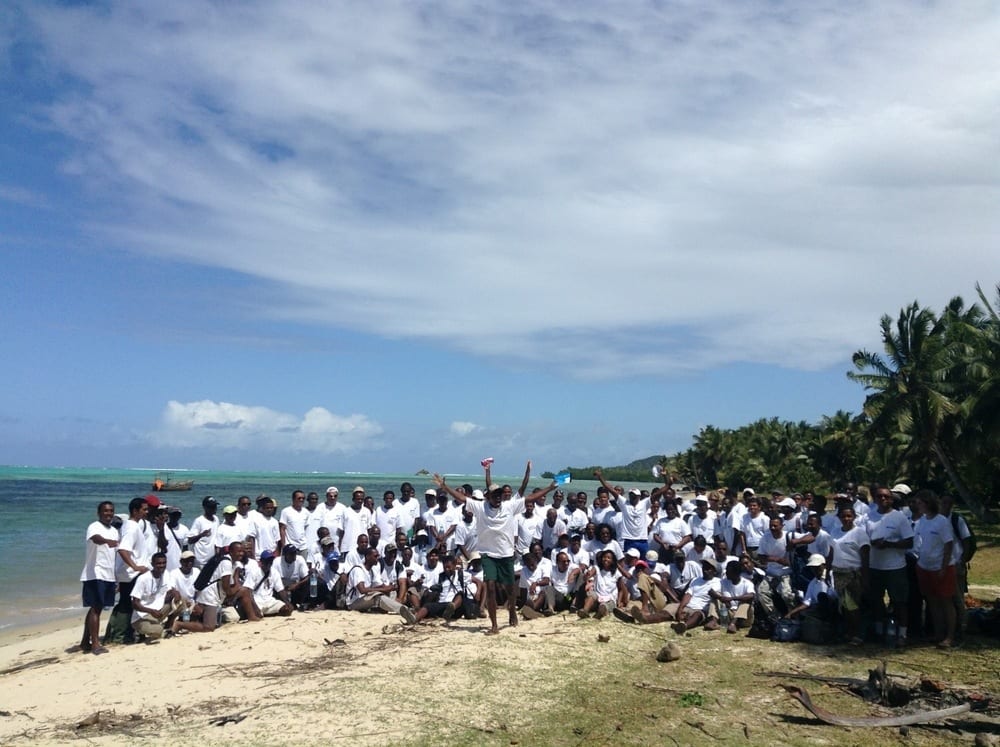MIHARI PRESS RELEASE
More than 100 leaders of fishing communities from all over Madagascar have now returned to their communities after the national MIHARI forum drew to a close, bringing important messages and lessons for the management of their natural resources.
The MIHARI network (MItantana HArena andRanomasina avy eny Ifotony) links local leaders, civil society, and policy makers engaged in promoting local management of marine and coastal areas and resources across Madagascar through “locally managed marine areas” (LMMA).
LMMAs are inshore or coastal areas where the primary responsibility to design and implement rules to manage the area lies with local communities. The concept was first developed in Fiji and has since spread to more than twenty-five countries around the world.
Since the first LMMA was set up in Madagascar nearly a decade ago, the LMMA movement has gathered pace. Now over 100 community associations are engaged in managing marine and coastal areas, including mangrove forests, and over 11% of the country’s inshore areas are under some form of local management.

The national forum was hosted by LMMA communities in Mananara from 12-16 October 2015, supported by a range of partners. The gathering allowed community leaders from different regions to exchange, engage with national policy makers, and discuss the development of the network’s capacity to support LMMA managers. Three government ministries took part in the forum this year: the Ministry of Aquatic Resources and Fisheries (MRHP), the Ministry of the Environment, Ecology, Oceans and Forests (MEEMF), and the State Ministry in charge of Presidential Projects, Land us planning and Equipment (MEPATE).
During the opening ceremony of the forum, Samueline Ranaivoson, Director of environmental enhancement and aquatic resources within MRHP said: “With around 5,600km of coasts, it’s not easy to manage Madagascar's shores. With that in mind, MRHP recognises the necessity of involving local communities in fisheries management, and their important role in ensuring these resources are exploited sustainably.”
Olivier Ramilison, Coordinator of the Coordination and Maritime Planning Cellule within MEPATE said: “It’s important that all users of Madagascar’s maritime territory work together to ensure it is well managed. MEPATE is therefore currently developing management policy for our maritime territory. We would like to reiterate our thanks to the MIHARI network for including MEPATE in this national forum. This has allowed us to discuss the main areas where collaboration and coordination is needed.”
André Tahindro, Director-General of Oceans in the Ministry of Environment, Ecology, Oceans and Forests gave the opening speech to open the forum, saying: “Our marine and coastal ecosystems are amongst the most productive, but also the most threatened […]. Good management is therefore essential to ensure food security and reduce poverty in coastal areas. The LMMA model presents many advantages over traditional MPAs managed by government, as LMMAS encourage a strong sense of ownership and motivation on the part of local communities, which can make them more effective. On top of this they are cheaper and therefore easier to replicate. Finally, the LMMA approach also conforms with the current administration’s policy for local government.”
The key conclusions and messages that MIHARI members will take away from the meeting include: i) that the government is working to develop legislation to better recognise LMMAs and secure the rights of traditional fishers to manage resources; ii) the priority for MIHARI members is to build a sustainable network with communities at its heart; and iii) that over the next year the MIHARI network will reinforce its presence in key regions of Madagascar to better support exchanges between LMMA managers.
Vatosoa Rakotondrazafy, MIHARI network coordinator said: “We were delighted to see all kinds of interesting discussions getting going during the forum. Fishers were glad to have the unique opportunity to raise important questions to government representatives. These covered conflicts with the industrial fleet and extractive industries, illegal fishing, national legislation for key species and equal sharing of benefits from fisheries. We look forward to taking forward these themes with policy makers and working together to increase the support for local managers of natural resources.”
Marine management is firmly on the national policy agenda given commitments made by the President of Madagascar at the World Parks Congress in Sydney to triple the coverage of marine protection. LMMAs have been recognised as a model that has proved its potential to significantly expand marine management in other developing countries.
For the first time, experts representing the International LMMA Network took part in the forum. The participants drew on a rich history of community-based management in the Asia-Pacific region to advise MIHARI members both on integrating local management into policy, and supporting LMMAs through networks.

Alifereti Tawake, member of the International LMMA network council and Fiji LMMA Network said: “I am honoured to have been able to take part in the MIHARI network forum this year. I hope our experience of going through similar challenges in other regions can help the MIHARI network go forward on the right track.
“In Fiji we are proud to be able to say that LMMA expansion was the key factor in enabling the government to reach a promise made in 2005 to place 30% of Fiji’s inshore waters under management. Nearly 80% of Fiji’s inshore area is now managed thanks to LMMAs. This model has been replicated, and LMMAs now provide the fundamental basis for coastal fisheries management in many surrounding Pacific island countries, providing crucial benefits to local people and safeguarding the marine environment. I am happy to say that from what I have seen Madagascar is on the right track, and I hope we can continue to exchange and support Madagascar to reach its goals.”
- For more information contact Vatosoa Rakotondrazafy, MIHARI network coordinator, [email protected]
Notes:
The MIHARI forum was made possible with the generous financial support of John D. and Catherine T. MacArthur Foundation. Additional support was provided from the Indian Ocean Commission and a number of other donors.

